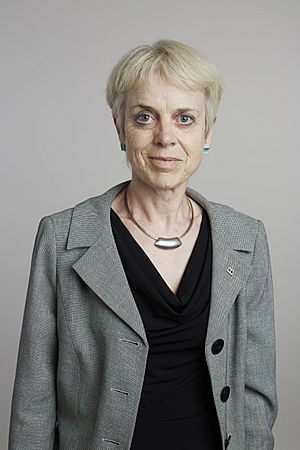Annette Dolphin facts for kids
Quick facts for kids
Annette Dolphin
FRS FMedSci
|
|
|---|---|

Dolphin in 2015
|
|
| Born |
Annette Catherine Dolphin
1951 Maidenhead, Berkshire, England
|
| Died | 26 January 2026 (aged 74–75) |
| Nationality | British |
| Alma mater |
|
| Awards | Physiological Society Annual Review Prize Lecture (2015) |
| Scientific career | |
| Fields |
|
| Institutions |
|
| Thesis | Behavioural and Biochemical Consequences of Cerebral Noradrenaline Receptor Stimulation (1977) |
Annette Catherine Dolphin (1951 – 26 January 2026) was a brilliant British scientist. She was a professor who studied how medicines affect the body, especially focusing on the brain, at University College London (UCL). Her important work helped us understand how our brains send messages.
Contents
About Annette Dolphin
Annette Dolphin dedicated her life to scientific research. She made many discoveries about how our brain cells communicate. Her work has helped other scientists understand more about the human body.
Early Life and Education
Annette Dolphin was born in Maidenhead, England, in 1951. She loved learning from a young age.
She attended the University of Oxford, where she earned a degree in biochemistry in 1973. Later, she continued her advanced studies at King's College London. In 1977, she earned her PhD. Her research focused on how certain signals work within the brain.
Important Research Discoveries
Professor Dolphin became a very important scientist in her field. She studied tiny "doors" in our brain cells called calcium channels.
Calcium channels control how calcium moves in and out of cells. This movement is vital for how our brain works and sends messages. She discovered how these channels are built and how they open and close. Her work helped us understand how our brains send messages and how medicines can affect them.
Before working at UCL, Professor Dolphin held positions at many famous places. These included the Collège de France, Yale University, and the National Institute for Medical Research. She also worked at St George's, University of London and the Royal Free Hospital School of Medicine.
Leading Scientific Organizations
Professor Dolphin also led important scientific groups. She was the President of the British Neuroscience Association from 2019 to 2021. She helped guide this group during the challenging time of the COVID-19 pandemic.
In 2022, she was chosen to be the President of The Physiological Society from 2024 to 2026. She also served on the Council of the Royal Society from 2023 to 2025.
Awards and Recognition
Annette Dolphin received many important awards for her amazing research. She won prizes like the British Pharmacological Society Sandoz Prize and the Pfizer Prize in Biology.
She also gave special talks, called 'prize lectures,' at different universities and societies. For example, she gave the Physiological Society Annual Review Prize Lecture in 2015.
In 1999, she became a Fellow of the Academy of Medical Sciences. This is a big honor for top medical scientists. Then, in 2015, she became a Fellow of the Royal Society. This is one of the oldest and most respected scientific honors in the world.
Her Legacy
Annette Dolphin passed away on January 26, 2026. Her groundbreaking work greatly advanced our understanding of brain function. She inspired many young scientists through her leadership and discoveries.
 | Isaac Myers |
 | D. Hamilton Jackson |
 | A. Philip Randolph |

